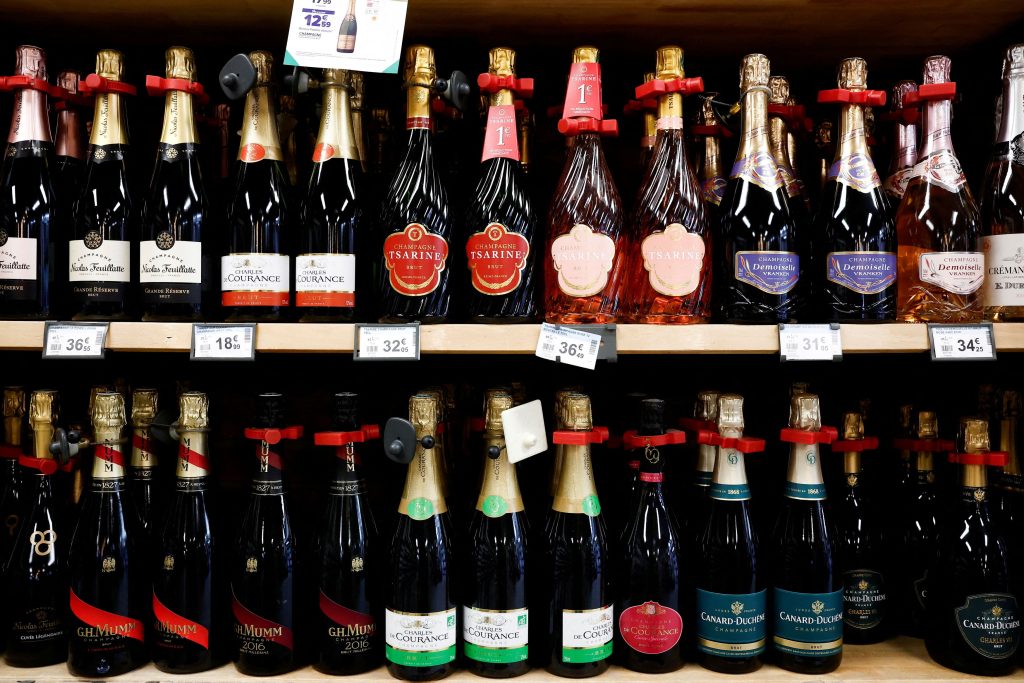European Union member states are preparing to present a united front in response to U.S. President Donald Trump’s sweeping new tariffs, with the bloc expected to approve initial countermeasures targeting up to $28 billion worth of American imports — ranging from chewing gum and toilet paper to diamonds and dental floss, says a latest Reuters report.
The move would place the EU alongside China and Canada in retaliating against the United States, marking an early escalation in what many fear could spiral into a full-blown global trade war. Economists warn that rising prices and disrupted supply chains could lead to a broader economic slowdown.

Farmers look at new farm machinery at a farm show in Regina, Saskatchewan, Canada, March 19, 2025. REUTERS/Ed White
The 27-nation bloc faces a 25% import tariff on its steel, aluminium, and car exports, and from Wednesday, nearly all other goods will be subject to a 20% reciprocal U.S. tariff. Trump’s tariffs cover about 70% of the EU’s exports to the United States — worth €532 billion ($585 billion) in 2024 — with additional duties on copper, pharmaceuticals, semiconductors, and timber expected to follow.
EU Response: Targeted Countermeasures
The European Commission, which oversees EU trade policy, will present member states with a list of U.S. products to face new tariffs, specifically in response to the steel and aluminium measures. The proposed list includes U.S. exports such as meat, cereals, wine, wood products, clothing, vacuum cleaners, and even dental hygiene items.
One particularly contentious item is bourbon, which the Commission has targeted with a steep 50% tariff. This has already drawn a strong response from President Trump, who threatened to impose a 200% counter-tariff on EU alcoholic beverages if the bloc proceeds.
France and Italy — both major wine exporters — have expressed concern over potential repercussions on their industries. Nevertheless, the EU aims to maintain unity in its response to increase pressure on Washington to return to the negotiating table.

FILE PHOTO: Bottles of French wine are displayed for sale at a supermarket in Paris, France, April 4, 2025. REUTERS/Benoit Tessier/File Photo
Seeking Unity Ahead of Tariff Vote
EU trade ministers will meet Monday in Luxembourg in the first political gathering since Trump’s tariff announcement. Officials are expected to align on a unified message: the EU remains open to dialogue but is ready to retaliate if necessary.
“Our biggest fear after Brexit was fragmentation and bilateral deals, but unity held through years of negotiations,” one EU diplomat said. “This situation is different, but a shared commercial policy remains in everyone’s interest.”
The proposed countermeasures will be put to a vote on Wednesday. Approval is expected unless a qualified majority — 15 member states representing 65% of the EU’s population — votes against them, which diplomats say is highly unlikely.
If approved, the retaliatory tariffs will take effect in two stages — starting April 15, with the remainder to follow a month later.
Diverging Views Within the Bloc
EU countries remain divided over the appropriate level of response. France has called for a robust package of countermeasures and even suggested suspending European investment in the U.S. until trade relations stabilize. Ireland, heavily dependent on U.S. trade, has urged caution and a “measured” approach. Italy, the EU’s third-largest exporter to the U.S., has questioned whether retaliation is even the right path.
“It’s a difficult balance,” one EU diplomat noted. “Too soft, and we risk being ignored. Too tough, and we risk escalation.”
Efforts to negotiate have so far failed. EU trade commissioner Maros Sefcovic said Friday’s talks with U.S. officials were “frank,” describing the tariffs as “damaging” and “unjustified.”
Industry Consultations Underway
European Commission President Ursula von der Leyen is holding separate consultations with industry leaders from the steel, automotive, and pharmaceutical sectors to gauge the potential impact and shape further strategy.
As the global trade landscape shifts, the EU is preparing not just to defend its industries, but to reinforce its role as a key player in the international economic order.



